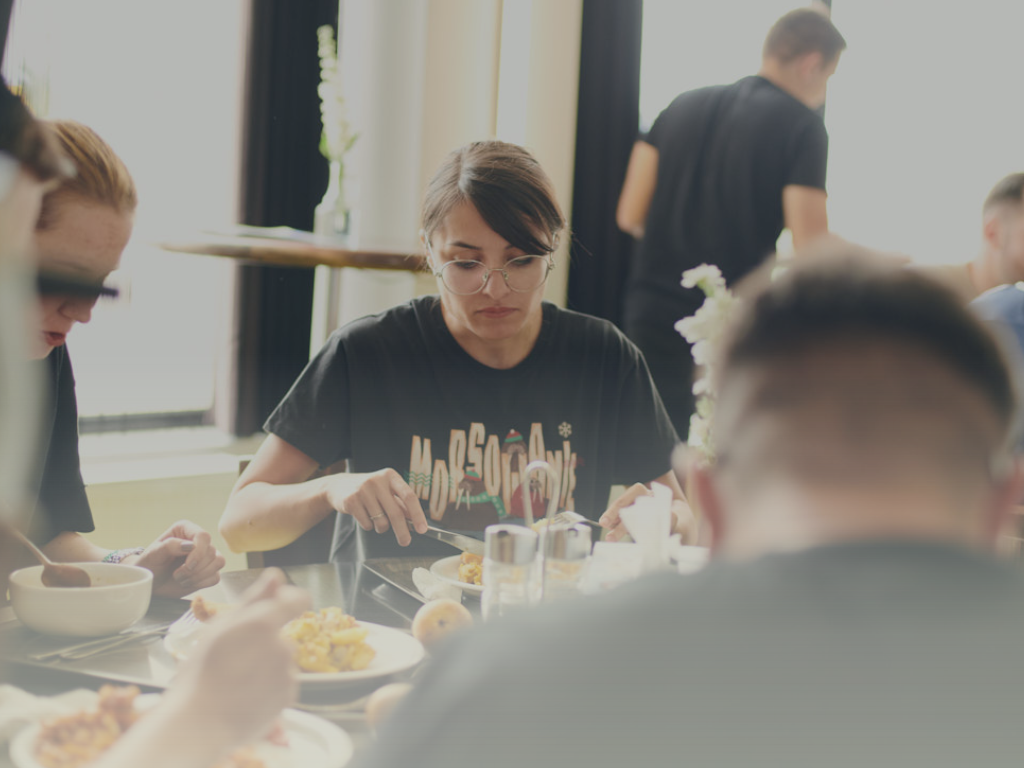
What is the day-to-day experience of a NetRom developer? This article provides an inside look at the working environment from the perspectives of four different generations currently collaborating within the organization. It illustrates what a typical day entails and how team members interact across varying career stages. From experienced professionals to early-career developers, each individual contributes distinct skills, perspectives, and working styles. Together, they form a team culture grounded in shared purpose, continuous innovation, and collaboration, supporting colleagues regardless of their background or level of experience.
What defines a successful workday?
The answer differs for each individual, and at NetRom, that diversity of experience is intentional.
For some, it may be the structured expertise of a Gen X engineer with years of technical knowledge; for others, it may be the balance and sense of purpose valued by many Millennials. A Gen Z developer may prioritize innovation and collaboration, while participants from Generation Alpha, such as those in the #NetRom4Students program, may be experiencing their first introduction to the technology field.
Across these perspectives, the organizational culture is consistently present. It shapes daily routines, collaboration practices, moments of rest, recognition of achievements, and opportunities for growth. Rather than being a superficial label, culture is embedded into the way work is carried out and experienced each day.
Where code meets culture
A typical day for a NetRom developer extends beyond coding, meetings, and project tasks. While technical work is central, the daily experience also reflects the broader environment in which it takes place.
At NetRom, the focus is not only on delivering high-quality code but also on creating conditions where developers feel engaged, supported, and motivated. The workday incorporates a balance of structured tasks and opportunities for creativity, collaboration, and professional growth, emphasizing that productivity is closely linked to a healthy and sustainable workplace culture.
Starting the day
At NetRom, mornings are designed to be flexible, allowing employees to begin the day in a way that suits their preferences. Instead of a rushed commute or a hurried start, the workplace is set up to provide a calm and comfortable transition into the workday.
Many employees arrive around 08:30, with the first stop often being one of the coffee corners. Professional coffee machines provide a variety of options, from espresso and lattes to herbal teas. For those who prefer breakfast at the office, fresh options such as pastries, sandwiches, and juices are available in the kitchen areas, creating a welcoming atmosphere to start the day.
Learning opportunities are also integrated into the morning routine. Internal training sessions and mentoring programs are offered regularly, encouraging employees to expand their skills or explore emerging technologies. Recent sessions have included topics such as Advanced Design Patterns and AI Prompting for Programmers, reflecting a culture where continuous knowledge sharing is embedded in daily practice.
Practical conveniences further support the start of the day. For example, employees who commute by car benefit from on-site parking and complimentary car washing services, reducing small logistical burdens and allowing greater focus on the day ahead.
This combination of comfort, professional development, and workplace support establishes a smooth foundation for a productive and engaging workday.

Kickoff and focus time
After initial conversations and a coffee, the workday shifts to project-related activities. Typically beginning with short stand-up meetings, synchronization sessions, or client check-ins.
Morning stand-ups are concise and structured, usually lasting no more than ten minutes. The focus is on identifying blockers, aligning on goals, and ensuring clarity across the team. This approach reflects an agile working style, where the emphasis is on minimizing unnecessary meetings and maximizing productive output.
Following alignment, developers transition into focused work. This may involve building new features, addressing technical issues, or refining existing code. The goal during this time is to support uninterrupted concentration, allowing for meaningful progress on development tasks.
NetRom emphasizes creating conditions that enable developers to focus. This includes reducing unnecessary interruptions, providing effective tools, and fostering an environment where deep work is prioritized. While autonomy is respected, collaboration remains accessible through digital platforms, whiteboard sessions, or informal discussions at desks.
Microbreaks and recharging
Sustained focus requires regular breaks, and at NetRom, employees have access to a variety of options to pause, recharge, and return to work with renewed energy.
For those who enjoy recreational activities, game rooms offer options such as table tennis, darts, chess, and console games. In the Timișoara office, musical instruments, including a guitar, provide a different way to unwind.
Quiet spaces are also available. Lounge areas are designed for relaxation, whether that means taking time with a book (supported through a partnership with Bookster) or simply stepping outside for a walk.
Employees who prefer physical activity can make use of the company’s multi-sport field, where informal games or organized tournaments, such as football, take place regularly. In addition, NetRom memberships include access to partner gyms across the city, offering flexibility for individual training.
These opportunities are not positioned as mandatory social activities but as options that employees can choose according to their preferences. The goal is to create an environment where taking short breaks contributes to sustained productivity and overall well-being.
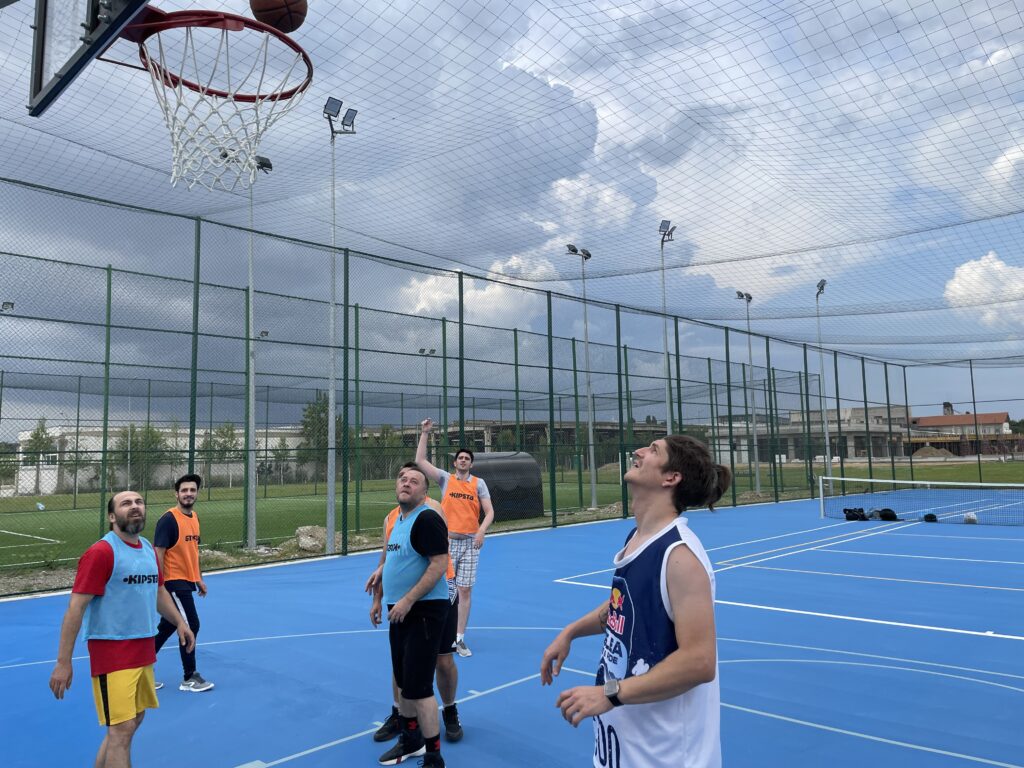
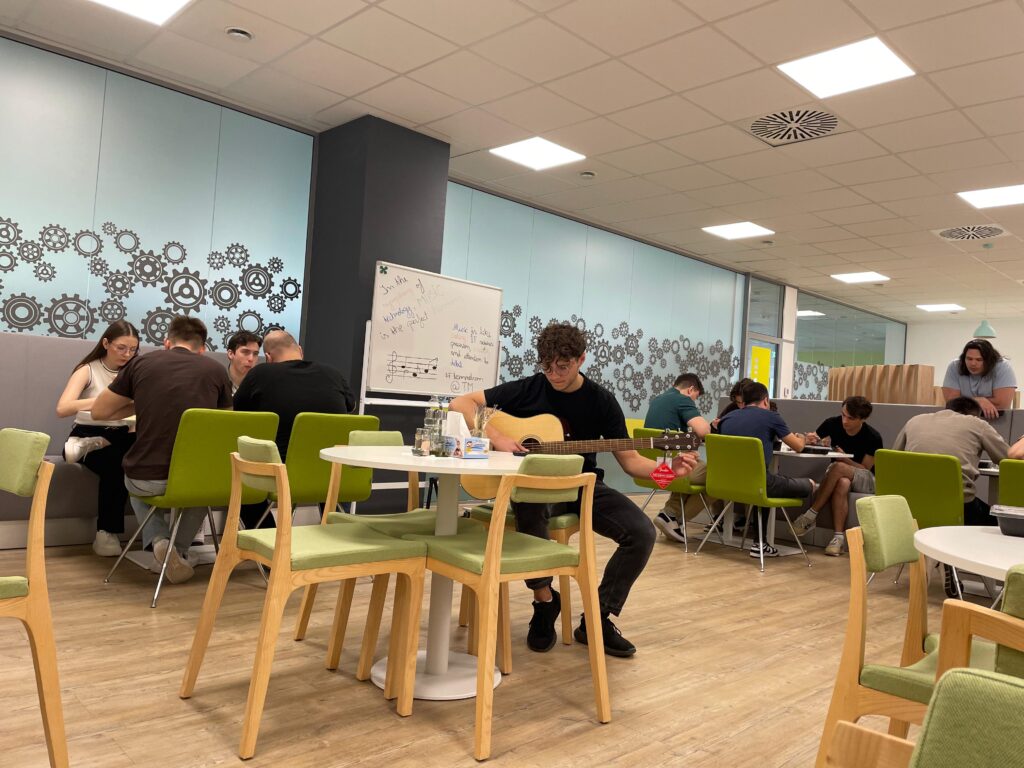
Lunch break
At NetRom, lunch is designed to be both convenient and enjoyable. Meals are pre-selected through an internal application, reducing the need for advance preparation or additional planning during the workday. The in-house kitchen team provides four hot meal options daily, along with a full salad bar and fresh fruit. Vegetarian dishes are included and given equal attention to taste and quality.
Beyond nutrition, lunch also serves as a social opportunity. Shared meals bring colleagues from different teams together, creating space for informal discussions that range from project-related ideas to upcoming company events. These interactions contribute to building connections across departments and provide a natural pause in the middle of the day to recharge before returning to work.
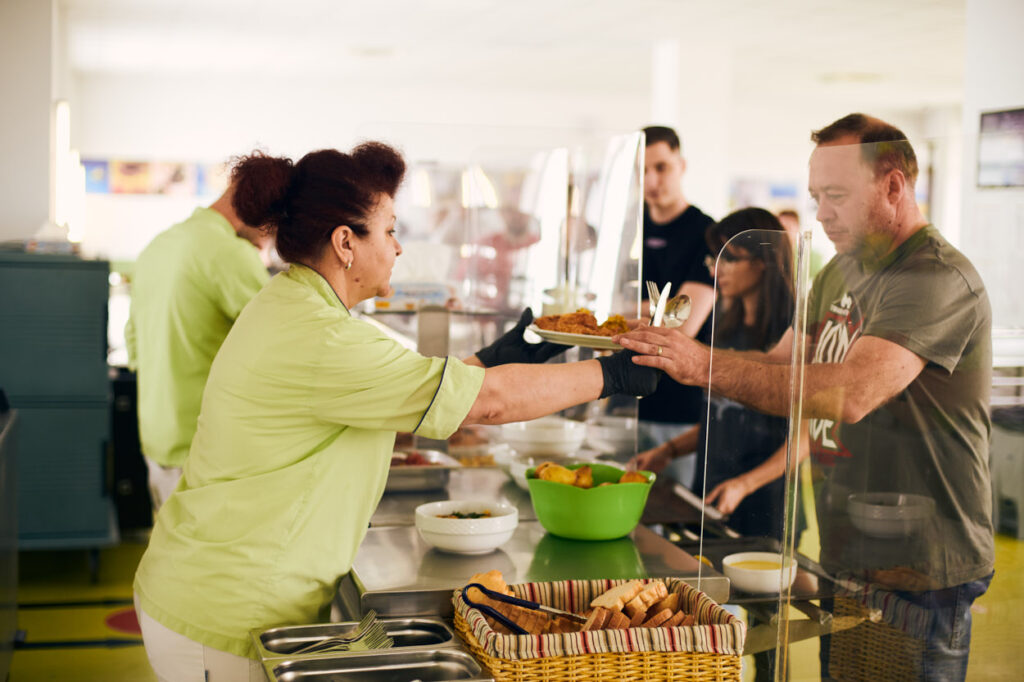
Flow, creativity, and autonomy
Afternoons are structured to support focused work, with minimal interruptions and few scheduled meetings. This time is often dedicated to building new features, refining existing functionality, conducting code reviews, or preparing documentation. Collaboration with designers, quality assurance specialists, or junior developers also plays an important role in advancing projects.
What distinguishes the environment at NetRom is the balance between autonomy and support. Developers are given ownership of their work and the freedom to approach tasks independently, while collaboration remains readily accessible. Whether through whiteboard discussions, peer code reviews, or quick problem-solving sessions, teamwork is encouraged without imposing unnecessary oversight.
The work itself goes beyond simply writing code. Developers contribute to long-term projects with practical applications, requiring both technical expertise and creativity. Knowledge sharing is embedded in the workflow, with activities such as code reviews and technical talks ensuring that individuals are supported while maintaining accountability for their contributions.
This combination of independence, collaboration, and meaningful project work fosters both professional growth and collective achievement.

Afternoon breaks
By late afternoon, employees often take a short pause to reset before wrapping up the day. This may mean stepping outside, taking a walk, or engaging in a brief activity to recharge. These moments provide flexibility, allowing individuals to manage energy levels in a way that supports both focus and well-being.
Wrap-up and transition
As the workday concludes, tasks are finalized and documented to ensure continuity for the following day. Developers may push code, leave notes for colleagues, or take part in informal brainstorming sessions on internal tools or side projects. The goal is to finish the day with clarity and a sense of accomplishment.
After work, employees choose how to transition into personal time. Some head directly home or to the gym, supported by the NetRom gym pass, while others stay for social activities such as game nights or friendly football matches on the company’s field. These options allow each individual to decide how to balance work, leisure, and community engagement.
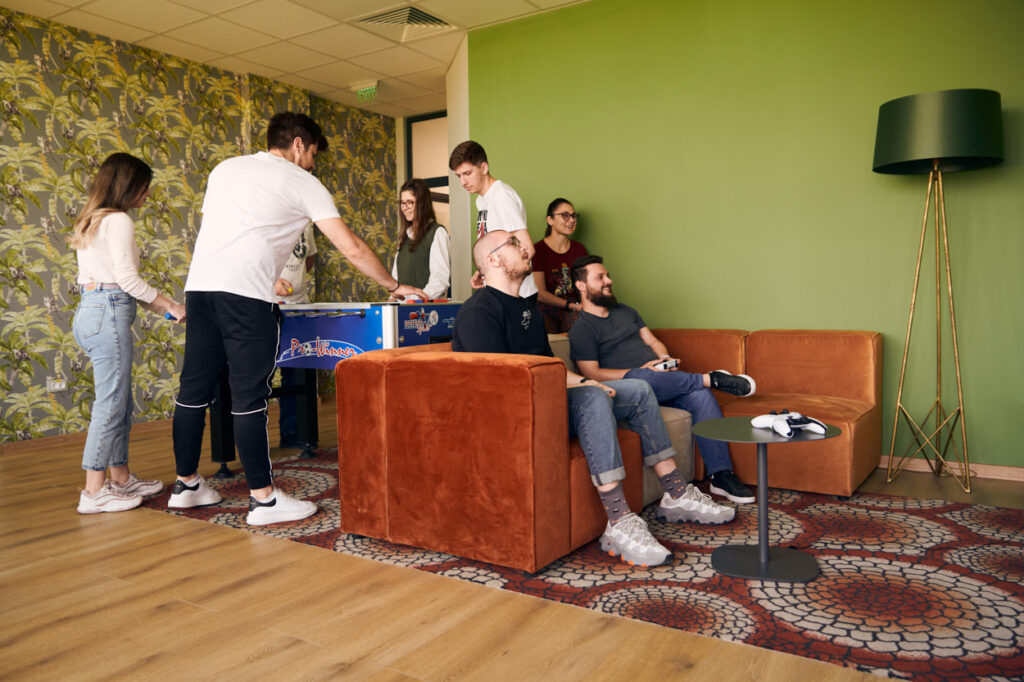
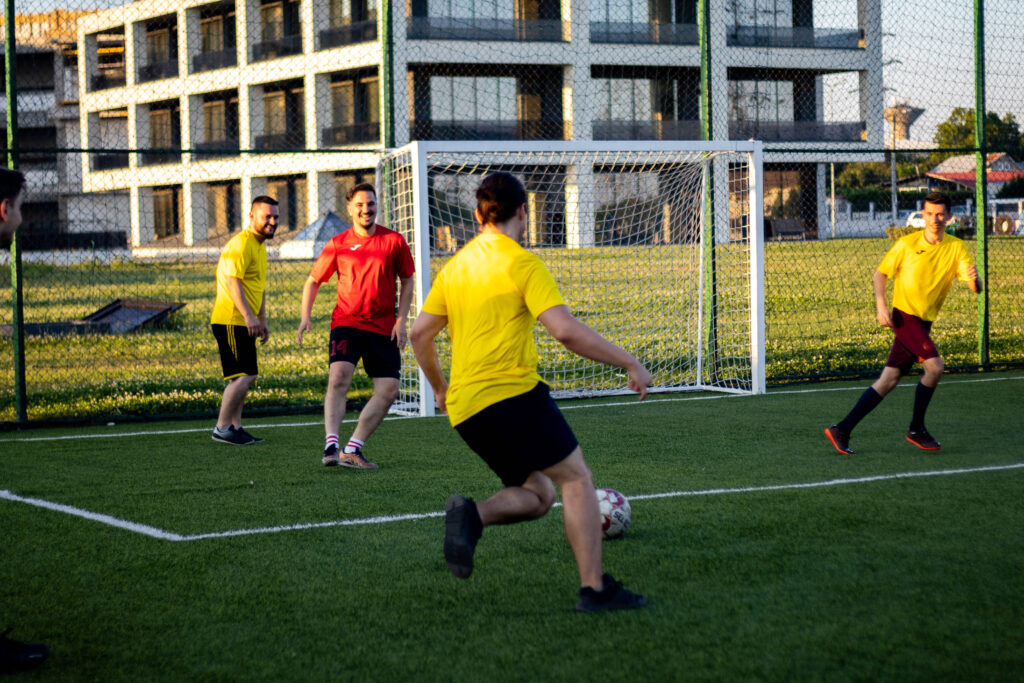
The NetRom experience
At NetRom, workplace culture is not treated as a slogan but as something lived day to day. It is reflected in mentorship, professional autonomy, collaboration across teams, and an environment that supports both individual and collective growth. The workplaces at the NetRom Campus are designed to accommodate different personalities and working styles – whether someone prefers focused, independent work or a more social, interactive approach.
Employees consistently highlight several priorities that shape their experience: meaningful work, flexibility in how tasks are approached, a culture that values well-being and development, and benefits that are practical rather than symbolic. These elements are integrated into daily operations and supported by leadership and peers alike.
Professional growth at NetRom extends beyond technical skill-building. Individuals are encouraged to take ownership of their work, explore new ideas, and learn through both successes and challenges. The result is an environment where people feel trusted, supported, and motivated to contribute to long-term projects with real impact.
Perks and amenities are valued, but what employees emphasize most is the sense of balance: avoiding burnout while maintaining high standards of delivery. The focus is on creating conditions where good work can be done sustainably, alongside opportunities to enjoy life outside of work.
Whether one specializes in frontend development, backend systems, or full-stack solutions, the environment is structured to provide both challenges and support. It is a place where technical expertise, creativity, and collaboration come together to shape rewarding career experiences.